

Environment
Pentagon warns of climate change security threat
Climate change presents a global security threat, increasing the risk of terrorism and conflict, and will fundamentally change the way the US military operates, the Pentagon has warned.
Blue & Green Tomorrow is currently running a crowdfunder to ensure its survival. Please pledge.
In a landmark new report, the US Department of Defense has presented its climate change adaptation roadmap.
Acting as “threat multipliers”, the impacts of global warming – from extreme weather and rising seas to resource scarcity and the spread of disease – will create new security risks and exacerbate conflicts around the world, the report concludes.
Significantly, the report notes that its findings are based not just on climate science but also on impacts already observed by the military in the field.
As temperatures rise and global greenhouse gas emissions increase, the roadmap outlines how the US military will attempt to adapt to a changing world.
The department says it will now begin integrating plans for climate change risks across all its operations, from war games and training to the operation of weapons systems. Extreme weather may make reconnaissance and surveillance more difficult, for example, while troops’ access to water may be affected.
The roadmap also considers how US forces may be required to respond to disasters at home and abroad.
“The military could be called upon more often to support civil authorities, and provide humanitarian assistance and disaster relief in the face of more frequent and more intense natural disasters,” writes US defense secretary Chuck Hagel in the report’s foreword.
“Our coastal installations are vulnerable to rising sea levels and increased flooding, while droughts, wildfires, and more extreme temperatures could threaten many of our training activities. Our supply chains could be impacted, and we will need to ensure our critical equipment works under more extreme weather conditions.
“Weather has always affected military operations, and as the climate changes, the way we execute operations may be altered or constrained.”
Another measure announced in the report is a new survey of over 7,000 military bases, assessing their exposure to climate risks. Some installations already require upgraded flood defences, the department revealed.
The report also expresses concern over the future of the melting Arctic, where nations will compete to exploit newly accessible resources, threatening not just the environment but also security. The report envisages an Arctic region kept secure by US forces.
At a speech upon the report’s publication in Peru, Hagel said the Pentagon’s conclusions demonstrate the urgent need for a global deal to curb carbon emissions.
“In two months, the United Nations will convene countries from around the world here in Peru to discuss climate change,” he said.
“Defense leaders must be part of this global discussion. We must be clear-eyed about the security threats presented by climate change, and we must be proactive in addressing them.”
In the report’s foreword, Hagel added, “politics or ideology must not get in the way of sound planning. Our armed forces must prepare for a future with a wide spectrum of possible threats, weighing risks and probabilities to ensure that we will continue to keep our country secure.”
Photo: DVIDSHUB via Flickr
Further reading:
Climate change a ‘catalyst for conflict’
Ed Miliband: Climate change is a ‘national security issue’
World Bank head warns of conflict and social unrest due to climate change
Pentagon warns terrorism could be exacerbated due to climate change































